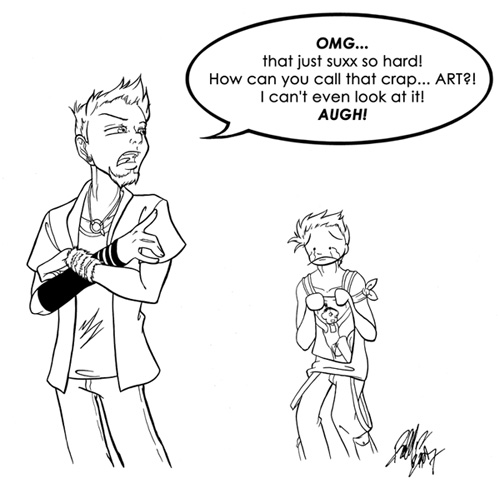One of the most underrated skills online, in my opinion, is that of giving effective feedback. Critique vs. criticism, feedback vs. "you suck." Anyone who's ever put their creative works and heart and soul out there on the internet or in real life probably has a few stories about bad experiences with a less than helpful reviewer. So this week I'm going to focus on feedback. Now, I'm talking about it in the sense of giving conventions and corporations feedback about the products and events that you like or that you think can be improved. Still, these pointers apply to artists, writers, or co-workers, and remember, when you talk to conventions and corporations, there are real people on the other end who are getting your feedback.
Giving Effective Feedback
Feedback can be a very effective tool, when given in a coherent and comprehensive manner. Sometimes by being the first one to speak up, you can encourage others with the same opinions to speak up as well. Many conventions host wrap-up panels at the convention itself as well as posting a comments thread on their message board. Use these venues to let the convention know what you thought. Just make sure what you're telling them is productive and useful. Also, scan through the previous comments to see what others have said; someone may have touched on the subject already. Which isn't to say you shouldn't add your opinion, but by building off of their comment, you encourage that person to keep posting as well as unify the fact that multiple people were upset. We'll talk a little more about what's useful to complain about and what will be ignored later on when we talk more about conventions.

By Bee
For example, critiquing like that will may cause the person to never try again. At the very least, it will most likely make them so angry they don't want to consider anything you say, even if you might have some valid points.
Likewise, this can work for companies , as many host message boards or post their e-mail address. There's some argument among letter writers about whether it's more effective to send an e-mail or a letter. An e-mail can promote a dialogue between you and the representative as well as be a quicker read, but it runs the risk of being overlooked or not taken seriously. A letter these days can be seen as overly formal to some, but it does give you the appearance of being more serious about the matter, since it takes more energy to write out a letter, print, and mail it than to simply send off an e-mail. Either format can be effective, though if you've got an actual petition I personally think a hardcopy with signatures looks more formal and imposing that just an e-mailed list. Also, don't overlook the value of a phone call in some cases.
When dealing with corporations, you will most likely have to write many letters and make phone calls when you can. The first step will be tracking down the chain of command and figuring out who actually has the power to make the changes you want. If your trying to get more anime into your local theater or more manga into the bookstore, you may very well find out that their order decisions are limited by those above them. Still, making your concerns known to the local people is a good step, as you might find that some of them are sympathetic to your cause and willing to join in your fight. For example, most of the bookstores I've been to that had excellent and well-stocked manga selections had those because there was a staff member who liked manga. It works for any genre or product, that if there is a staff member that appreciates it, they will make sure the section is the best it can be. Even the staff at your local Barnes and Noble does have a limited amount of control over what goes on to their shelves. It's far more limited than that of someone at an independent store, but they do have some power.
One thing you should always remember when giving feedback is to start with something positive. There must be something you like about the event/company, or else you wouldn't be bothering to try to improve them. Saying something like "I admire the quality of anime programming that you are bringing to movie theaters across the country and would like to see more titles offered to my local theaters." Is a much better way to start out than just saying "Why aren't we getting any anime in my small town?" By starting on a positive note, you immediately let them know that they are doing things that you really like, and therefore it makes them more receptive to your criticism. People tend to get defensive if they just hear a complaint and are much more likely to disregard your comments as just you not understanding their vision or intent.
I hope you enjoyed this week's discussion and that it will be useful in your daily life, as we all end up in situations where giving feedback is necessary and useful. Next week I'll be covering how conventions are run for the fans and hopefully giving you a bit of insight into the workings of your local convention. Feel free to leave questions here.